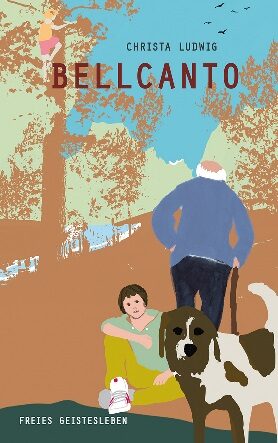Christa LudwigSünne van der Meulen
Bellcanto
[Bellcanto]
- Verlag Freies Geistesleben
- Stuttgart 2016
- ISBN 978-3-7725-2797-5
- 229 Pages
- 10 Suitable for age 11 and above
- Publisher’s contact details
Sample translations
How to find yourself while running away
Things are pretty much the same for old Herr Heyse, who is constantly at loggerheads with the carers in his old people’s home. He calls the dog ‘Bellcanto’ on account of its beautiful voice, and is extremely unwilling to share it with anyone else. Outside in the big wide world Herr Heyse couldn’t manage on his own, so he does a runner together with Bellcanto and the boy - of whom in truth he disapproves. Without a shred of sentimentality Christa Ludwig in her novel Bellcanto tells the story of Robin and the old man embarking on their roadtrip and squabbling their way around southern Germany. The old man mocks the boy mercilessly on account of his fatness - and his barbs are uncomfortable for the reader too, especially as the child half-seeks guidance from his curmudgeonly companion, who to start with at least does nothing but order him around in the harshest terms.
The obstacles they encounter on their journey do bring them closer together, though it only ever takes a single careless word to shatter their fragile rapport again. Christa Ludwig recounts the story from the perspective of the boy, who is particularly sensitive to the many nuances in the pair’s relationship. It is only when the old man for the very first time adds the word ‘please’ to one of his commands that Robin feels able to show him respect.
The dog means everything to both man and boy, and the tension becomes very marked when a misunderstanding ends up with Bellcanto floundering in the swirling currents of a mountain stream. His saviour proves to be a girl - Olga. Robin falls in love with her. From this point onwards the two runaways co-operate more amicably with one another. It is their longings that bind them together - but these longings are extremely difficult to fulfil. Robin wants to escape his physical body, while Herr Heyse wants to make good his past mistakes in his dealings with his family. Both aspirations are impossible to achieve. In the novel’s dramatic finale, however, Robin does attain to a new perspective on his life. The pair’s decision to turn their backs on the rigid structures that had entrapped them - albeit by running away from them - changes both of them in the end.
The novel carries conviction chiefly because Christa Ludwig remains true to its protagonists at every turn. The classic pattern of the ‘roadtrip’ whereby an outward, physical journey is accompanied by an inner one, is fully borne out here, without any glossing-over of the conflicts it involves. There is no trace of kitsch, not even in the representation of the dog, who functions more as a catalyst than as a saviour. Here is an author who knows exactly how to convey the reactions and the very soul of a dog without ever anthropomorphising it. Bellcanto is a presence in his own right from start to finish - a presence that gives delight to the reader and thus endows the book with a happiness-inducing Something that ensures its success, precisely because it remains inexplicable.
Translated by John Reddick

By Thomas Linden
Thomas Linden is a journalist (Kölnische Rundschau, WWW.CHOICES.DE) specializing in the areas of literature, theater and film. He also curates exhibitions on photography and picture book illustration.
Publisher's Summary
Ein Hund für zwei [A dog for two]
He gets into fights, ditches school, steals from the supermarket.
Robin's profile reveals he has problems at home. And they’re supposed to disappear just because a dog comes and visits him on a regular basis? At first Robin is suspicious of Bellcanto much in the same way Heyse, the grumpy old age home resident, feels towards people. Slowly but surely, Bellcanto brings the two of them together and accompanies them on a secret journey.
A sensitively told story filled with mystery and suspense about astounding encounters, growing trust, and the zest for life a dog can give.
(Text: Verlag Freies Geistesleben )
